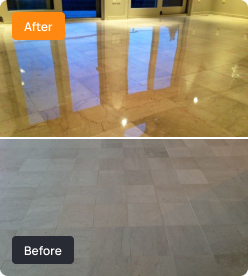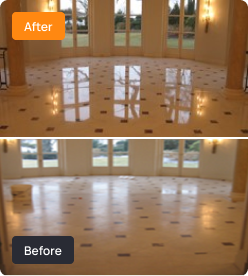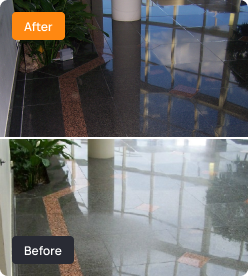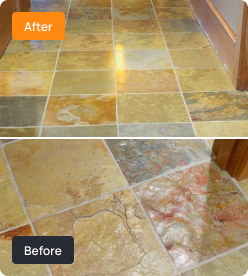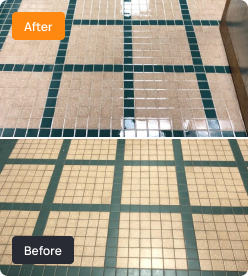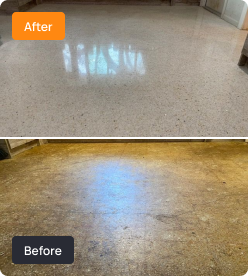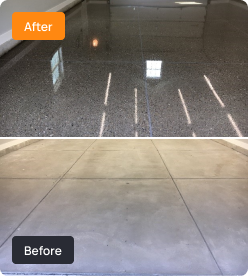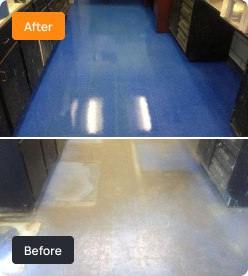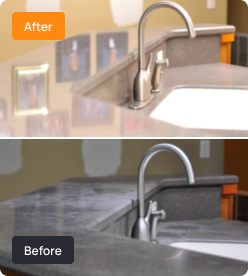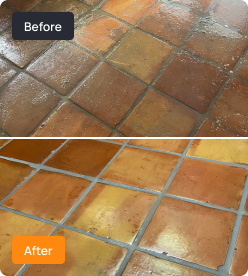Think Vinegar Makes Your Tiles Shine? Think Again
We often turn to time-honored methods to maintain the cleanliness and luster of our homes. However, we sometimes unwittingly follow myths that can be more damaging than beneficial. Vinegar, in this regard, is a classic example of such a myth, with its negative aspects not immediately evident. The supposed effectiveness of vinegar in cleaning tiles […]
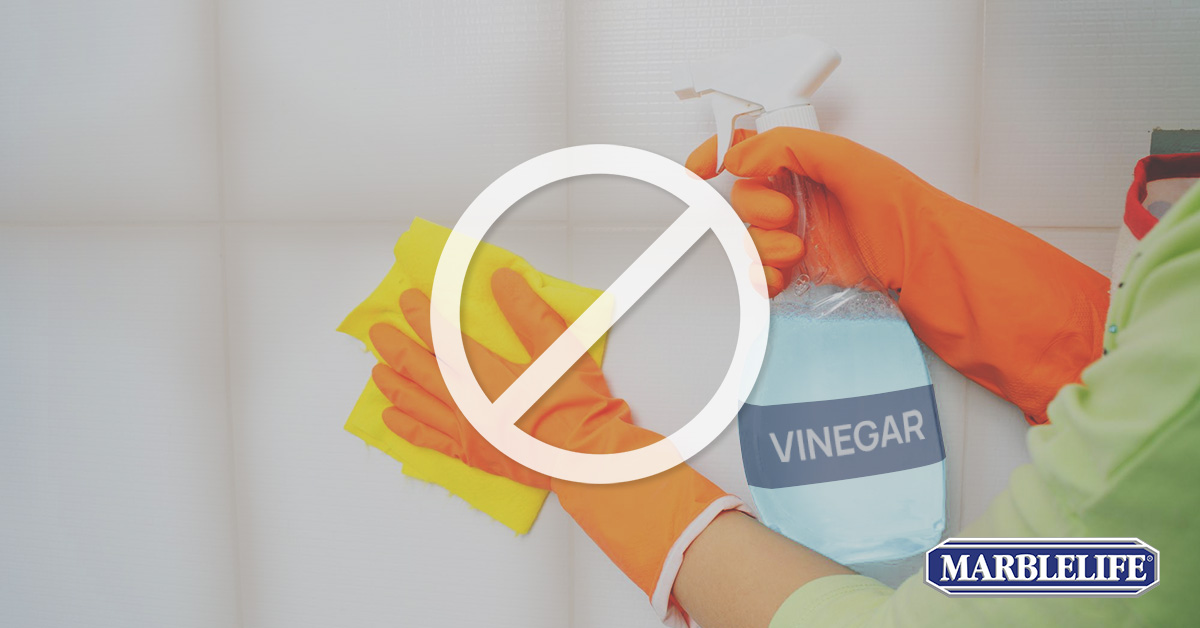

We often turn to time-honored methods to maintain the cleanliness and luster of our homes. However, we sometimes unwittingly follow myths that can be more damaging than beneficial. Vinegar, in this regard, is a classic example of such a myth, with its negative aspects not immediately evident.
The supposed effectiveness of vinegar in cleaning tiles and grout is one such myth. Vinegar’s effect on various materials, including marble, travertine, granite, ceramic, and porcelain, may differ, but it consistently leads to long-term harm. Despite widespread belief in its miraculous ability to leave tiles sparkling, it’s essential to question this notion and delve into the science and chemistry of proper tile care.
The pH Factor: Understanding Vinegar’s Acidity
Understanding the role of pH in tile cleaning is essential. Here, we’ll break down the science behind it:
The pH Scale:
- The pH scale measures acidity and alkalinity, ranging from 0 to 14.
- The neutral pH is 7; values below 7 are acidic, and values above 7 are alkaline.
- Vinegar typically has a pH of around 2.4, placing it firmly in the acidic range.
Vinegar’s Acidity:
- Vinegar is often used for cleaning due to its acidic properties, which can effectively tackle grease and grime.
- Its ready availability makes it a convenient choice for many cleaning tasks.
Excessive Acidity and Tile Damage:
- Although a mild level of acidity can aid in dirt removal, excessive acidity, such as that found in vinegar, can be detrimental.
- Over time, highly acidic substances can etch the surfaces of certain tile materials, including marble, limestone, or travertine. This results in a dull and damaged appearance. Repairing this type of damage often requires a professional to diamond grind the floor surface, making it an expensive mistake. Therefore, vinegar should never be used on these surfaces.
- Another significant risk is the removal of the sealant that protects both sanded and non-sanded grout from stains. More than 70% of tile-and-grout floors experience grout staining issues due to the use of inappropriate, acid-containing cleaners that erode the silicone seal. These acids can include vinegar, lemon juice, and various other acidic chemical additives with citrus or similar scents.
- There are more effective and safer methods for degreasing surfaces. For instance, MARBLELIFE’s former parent company, Union Carbide, developed the first surfactant-based cleaning systems in the market. This technology laid the foundation for the development of MARBLELIFE’s specialty surface cleaners.
The Science of Cleaning
Cleaning tiles effectively is not just about elbow grease; it’s about understanding the intricate chemistry behind it. Let’s explore the scientific aspects that come into play when it’s time to remove dirt and stains from your tiles.
Chemistry of Dirt and Stains
- At its core, cleaning is a battle against molecules. To clean effectively, we must comprehend how dirt and stains adhere to tile surfaces on a molecular level.
- The bonds formed between dirt particles and your tiles can be surprisingly strong.
How Cleaning Agents Work
Different cleaning agents employ various chemical processes to break these bonds. Here’s a brief overview:
- Emulsification: Some agents break down grease and oils into tiny droplets, making them easier to rinse away.
- Saponification: This process turns oil and grease into soap-like substances that can be washed away with water.
- Oxidation: Certain cleaning agents harness the power of oxygen to break down and remove stains.
Each process has its strengths and weaknesses, depending on the type of dirt or stain being tackled.
Limitations of Vinegar
- While vinegar can be effective for some cleaning tasks, it’s not a one-size-fits-all solution.
- Vinegar’s chemical composition makes it better suited for certain types of stains, such as mineral deposits.
- However, it is not be ideal for stubborn stains, grout cleaning, or delicate tile surfaces. In fact, it will do serious and expensive damage requiring the services of a professional surface restoration company.
The Impact on Tile Materials
Understanding how different cleaning agents interact with various tile materials is essential for maintaining the integrity and aesthetics of your tiles. Let’s explore the specific impact of cleaning agents, particularly vinegar, on different types of tile surfaces.
Tile Types Matter
- Tiles come in a variety of materials, including marble, granite, limestone, and porcelain, each with its unique characteristics.
- The choice of cleaning agent can significantly affect these surfaces, and what works for one type of tile may not be suitable for another.
Vinegar and Tile Damage:
Vinegar’s high acidity can pose a risk to certain types of tiles. Here’s how it can impact them:
- Marble and Limestone: These calcareous stones are highly susceptible to acid etching. Vinegar can corrode the calcium carbonate in these tiles, leaving behind permanent damage, in the form of dissolved away materials. Vinegar and acids like it can dissolve a hole through these surfaces if delivered in a steady drip. Wipe on and wipe off and it will micropit the surface removing its glossy appearance dulling the surface.
- Granite and Porcelain: While less vulnerable, prolonged exposure to vinegar will remove the granites seal opening it up to staining, and will stain grout used with porcelain in a tile-and-grout floor.
- It’s important to note that even though vinegar can clean surface stains effectively, its use on certain tile types may lead to irreversible damage. To put this in perspective, MARBLELIFE uses acids to remove floor and counter seals when we seek to treat or clean a stained surface, before re-sealing. The removal of that seal takes one application – just once – is enough to do damage.
Alternative Cleaning Products and Recommendations
While vinegar has its merits as a household cleaner, its compatibility with various tile types can be a bit of a minefield. Fortunately, there are alternative cleaning products that are not only effective but also safer for your tiles. We’ll introduce you to these alternatives and provide recommendations tailored to different tile types.
Better Cleaning Agents: It’s time to meet some cleaning agents that are better equipped for the task. These alternatives are carefully formulated to clean effectively while safeguarding your tile surfaces.
Here are a few to consider:
- Non-Acidic Tile Cleaners: These cleanersavoid acidic ingredients , making them suitable for various tile types. They effectively remove dirt and stains without causing harm.
- Specialized Stone Cleaners: If you have natural stone tiles like marble or granite, opt for cleaners specifically designed for these materials. They work harmoniously with the stone’s composition, ensuring a thorough yet gentle clean without affecting the degreasing cleaning required
Grout Cleaners
For stubborn grout stains, specialized grout cleaners can tackle the toughest grime without harming your tiles. This is a specialty area as it requires a cleaner formulated to allow the cleaner to penetrate tight grout pores and float out dirt, grime and grease, in order to alleviate that grout stained appearance.
Product Recommendations:
The right product depends on your tile type and your specific cleaning needs. Here are some recommendations:
- Battling with grime, dust, or daily dirt on your tiles? Restore their natural shine with a MARBLELIFE cleaner tailored to your specific product including MARBLELIFE TILE AND GROUT CLEANER, MARBLELIFE MARBLE & TRAVERTINE CLEANER or MARBLELIFE GRANITE & QUARTZ CLEANER.
- Want to protect your grout from stains and discoloration? Shield it effectively with MARBLELIFE GROUT SEALER. This applies to your marble or granite surfaces as well with MARBLELIFE STONE SEALER. Sealers should be applied only after cleaning the grout line else one will seal in the grout stain permanently. MARBLELIFE MAXOUT DEEP CLEANING GROUT CLEANER is ideal for clearing stained grout formulated to lift dirt and grime from narrow grout pores.
- Concerned about dark spots, mold, or mildew on your tiles? Trust MARBLELIFE Mold & Mildew Stain Remover Cleaner to clean it with minimal effort. Fast and effectiive.
Tips for Effective Cleaning:
Regardless of the cleaning product you choose, here are some universal tips for effective and safe tile cleaning:
- Always follow the manufacturer’s instructions on product usage and dilution ratios.
- Test any new cleaning product in an inconspicuous area to ensure it doesn’t harm the tile or grout.
- Use soft, non-abrasive cleaning tools like microfiber cloths or soft brushes to prevent scratching.
- Regular maintenance and prompt cleaning of spills can reduce the need for heavy-duty cleaning.
- Make sure your surface is NON-POROUS (Ceramic and Porcelain) or SEALED (Marble, Granite, Travertine, Limestone, Concrete, Terrazzo and grout) to keep dirt and grime on the surface where it is easier to clean. Seal with MARBLELIFE GROUT SEALER or STONE SEALER. If suffering from STAINED GROUT, try MARBLELIFE MAXOUT DEEP CLEANING GROUT CLEANER formulated specifically for such challenges.
- Got Mold? Then you will love the fast effective performance of MARBLELIFE MOLD AND MILDEW CLEANER – we use it because it requires minimal if any agitation to power through even the worst mold and mildew problems.
- Got Soap Scum – MARBLELIFE SOAP and SCUM REMOVER is so fast and effective you can HEAR and FEEL it work and when it is done.
- Clean surface with a surface specific MARBLELIFE Daily Cleaner.
The Importance of Professional Tile Restoration
While effective tile cleaning methods are essential, there are instances when do-it-yourself (DIY) approaches may fall short of restoring your tiles to their former glory. Not every surface is CLEANABLE. What that means is that if you are cleaning with an effective cleaner but it still looks dull and dirty – your surface may be damaged, and need a restorative surface before a CLEAN APPEARANCE can be achieved.In these cases, the expertise of professional tile restoration services becomes invaluable. Let’s explore the significance of entrusting your tile maintenance to the hands of experts.
Complex Issues Require Expertise
- Tile issues can range from surface stains to deep-seated problems within the tile and grout structure. Professionals are trained to diagnose and address a wide array of issues accurately.
- Professional intervention is often the most effective solution for complex problems like deep-seated stains, tile discoloration, chips and cracks or structural damage.
The Right Tools and Techniques
- Professionals have access to specialized equipment and techniques that are not readily available to the average homeowner. These tools can provide superior results while minimizing the risk of damage.
- Techniques such as honing, polishing, and sealing are essential for restoring natural stone tiles to their original beauty. Professionals are well-versed in employing these techniques effectively.
Tailored Solutions
- Every tile surface is unique, and a one-size-fits-all approach may not yield optimal results. Professional tile restoration services provide tailored solutions based on your specific tile type, condition, and cleaning needs.
- Their expertise allows them to choose the most suitable cleaning agents and methods, ensuring the preservation of your tiles.
Long-Term Savings
- While professional tile restoration may come with an initial cost, it can lead to long-term savings. Expertly restored tiles are less likely to suffer from damage, reducing the need for costly repairs or replacements.
- Additionally, maintaining the integrity and aesthetics of your tiles can enhance the overall value of your property.
MARBLELIFE’s Expertise
- MARBLELIFE specializes in hard stone restoration and tile maintenance. With decades of experience, their professionals are well-equipped to handle a wide range of tile-related challenges.
- From restoring the natural beauty of marble to rejuvenating the shine of granite, MARBLELIFE’s expertise is unmatched in the industry.
Are you looking for tile care services? Discover the range of services offered by MARBLELIFE.
MARBLELIFE offers FREE CONSULTATIONS. As such you are a call away from being free of your CLEANER FRUSTRATION and ACHIEVING CLEAN.
In conclusion, while DIY tile cleaning can be effective for routine maintenance, there are situations where professional tile restoration services offer a superior solution. With their knowledge, tools, and tailored approaches, professionals can help you maintain the longevity and aesthetics of your tiles, ensuring they remain a source of pride in your home or commercial space.


